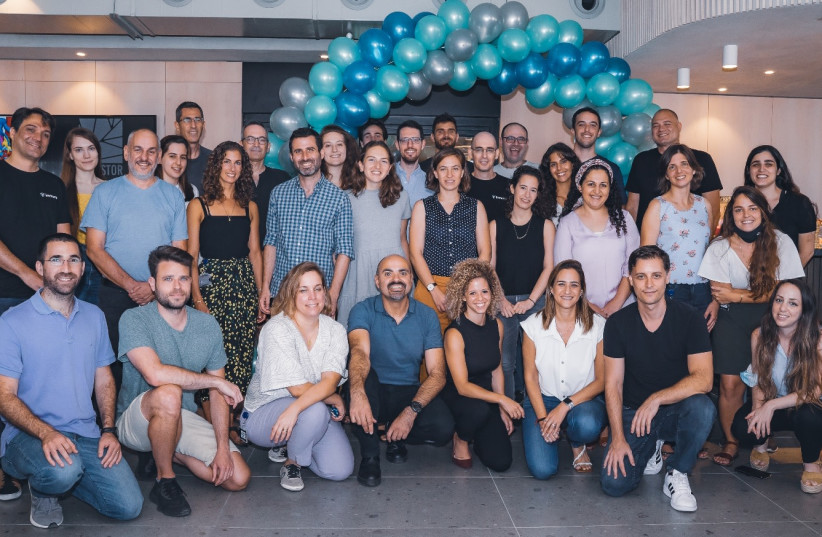Mega funding rounds are definitely a thing now and Israel saw three new deals of over $100 million in the past week, making that 10 such rounds in October.
Immunai, Fabric and Augury also joined the unicorn club, as their post-investment valuations topped $1 billion. Israel now has 74 such unicorn companies, according to tech community hub TechAviv.
The third quarter of 2021 had a total of 21 rounds of more than $100m., IVC and the Meitar law firm noted in a recent report.
Israel’s hi-tech sector is exceeding all expectations this year, raising more than $19 billion so far, and is on pace to more than double previous funding records.
Immunai, a biotech company, announced a $215m. Series B round, increasing its valuation to more than $1 billion and raising its total funding to date to $295m. The new capital will be used to expand Immunai’s “drug actuary” platform for target validation and evaluation.

The Israeli-American company uses single-cell genomics and machine learning to discover and develop novel therapeutics that reprogram the immune system. Immunai has tripled in size in the last year, with more than 120 employees (70 of whom are PhDs or MDs) in New York City, Tel Aviv, Zurich, Prague and San Francisco. The company has more than 30 partnerships with Fortune 100 pharmaceutical companies and leading academic institutions, it said.
Fabric entered the unicorn club when it sealed a $200 million Series C funding round, established itself in the on-demand fulfillment space, leveraging its robotic micro-fulfillment technology stack to make on-demand fulfillment profitable and scalable for retailers.
Fabric runs micro-fulfillment operations for grocery and general merchandise retailers in New York City, Washington, DC and Tel Aviv, and it recently announced major partnerships with Walmart, Instacart and FreshDirect. Fabric will use the funds to expand its global team, which currently has over 300 team members with offices in New York City, Tel Aviv, and Atlanta.
Haifa-based Augury, which makes IOT and AI-driven Machine Health solutions to predict and prevent industrial machine failures, secured $180m. in new funding bringing its valuation to over $1b. With this round, Augury has raised a total of $286m.
The proceeds of this round, combined with unused funds from its Series-D round, will give Augury over $200 million to expand globally and create offerings for new industries such as energy. The company’s customers include Colgate-Palmolive, PepsiCo, Hershey’s ICL and Roseburg.
Tel-Aviv’s BackBox closed a $32 million Series A round of growth financing led by Elsewhere Partners for its comprehensive network management and security solutions. The company already works with 180+ partners such as CheckPoint, Cisco, F5 and Palo Alto Networks to support more than 500 types of software and devices with its intelligent automation solutions.
Haifa-based Tactile Mobility raised $27m. as part of a Series C funding round led by Delek Motors. This brings Tactile Mobility’s total funding to $47m. The company, which leverages existing vehicle sensors and AI to equip vehicles with a sense of “touch”, will use the funds to support rapidly growing demand and expand into new segments.
Autofleet, an optimization platform for fleet owners and operators, closed an oversubscribed $20b. Series B round of funding led by Keyframe Capital. In addition to growing its R&D team, Autofleet will use proceeds to open offices in Singapore, London and New York to accelerate growth and support clients in those markets. Since closing its Series A last year, Autofleet has scaled its operations in over 12 countries and demonstrated significant improvement in key performance indicators such as reducing fleet downtime by 80 percent, reducing customer wait times by 15% and boosting utilization and revenues by 10%.
Cyabra, which can detect inauthentic narratives and fake news within online conversations, raised $5.6m. in a Series A round led by OurCrowd. The new funds bring Cyabra’s total funding close to $7.6 million raised.
Founded in 2018, Cyabra has reported a 400% growth in revenue, with clients and partners including the US State Department, global advertising agency TBWA and several large financial institutions.
On the acquisition front, Tokyo’s Renesas Electronics Corporation acquired Raanana-based Celeno Communications, which provides smart, innovative Wi-Fi solutions, for up to $315 million, depending on achieving certain milestones. The acquisition enhances Renesas’ connectivity portfolio with the addition of Celeno’s industry-leading Wi-Fi technologies and software expertise, the semiconductor company said. Celeno has operated since 2005, and has raised some $114m. in funding.
Bizzabo, an Israeli event success platform, acquired Tel Aviv-based TeeVid, a four-year-old solution for creating, producing and broadcasting virtual events. The value of the deal was not disclosed. This was Bizzabo’s third acquisition in the last five months, following its acquisitions of x.ai and Whalebone.
